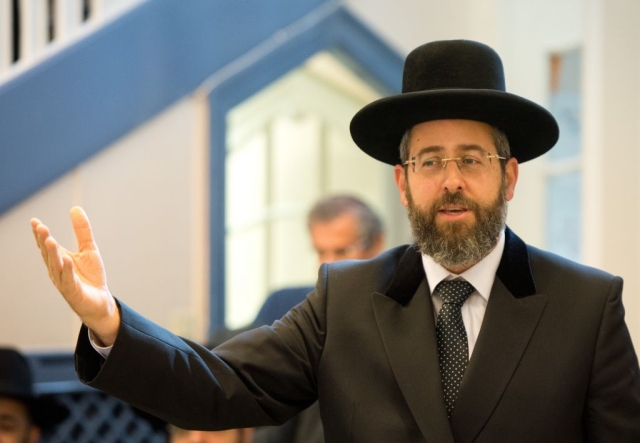In a move reflecting the complex interplay of religion and politics in Israel, Chief Rabbi David Lau recently dispatched a poignant letter to the Abbott of Stella Maris Monastery in Haifa. The letter was in response to a series of unsettling events targeting the monastery and the religious individuals connected with it. Sent last Sunday, the Rabbi's correspondence conveyed unequivocal condemnation of any violent acts against religious figures or their sacred spaces. Moreover, it highlighted the acute necessity for interfaith respect and unity.
Rabbi Lau's missive arrives during a pivotal period, serving to underscore Israel's broader commitment to fostering mutual respect among its manifold religious communities. He reminded his audience of the particularly agonizing history of religious persecution endured by the Jewish people. "Throughout the annals of history, Judaism has been subjected to more persecution than any other faith," Rabbi Lau declared. "This grim legacy compels us even more to stand vehemently against any conduct tinged with violence."
The Chief Rabbi further appealed to the collective ethical responsibility to honor and protect the dignity of others. He was explicit: "Violating personal property, or obstructing the religious practices and leaders, is an absolute affront to human dignity and is strictly impermissible." Citing the well-regarded Jewish ethical maxim, Rabbi Lau added, "What is hateful to you, do not do to your friend."
Israel's chief Rabbi defends Christians amid attacks on Stella Maris: In his letter, sent on Sunday, Ashkenazi Chief Rabbi David Lau underscored the essence of respect and unity amongst diverse faiths. JPost https://t.co/uNVfTMUWz3 pic.twitter.com/VpF4GHc68u
— Jewish Community (@JComm_NewsFeeds) September 7, 2023
While Rabbi Lau expressed confidence in law enforcement's ability to address these emerging challenges effectively, his assurances have not been universally welcomed. Wadie Abunassar, the coordinator of the Holy Land Christian Forum, insisted that governmental actions must go beyond mere rhetoric. He remarked, "While commendable words from state officials are appreciated, it is actions that ultimately speak volumes."
Abunassar openly questioned the government's perceived lack of engagement, offering two provocative questions: Would the Israeli government react differently if the assailants were Arabs or Christians targeting the Jewish community? How would the state respond to comparable threats directed at Jewish diaspora communities?
For Palestinian Christians, terror, victimization, brutalization, and murder are daily occurrences.
— RedBrasco - RedLehi (@redbrasco) September 4, 2023
Growing numbers of Palestinian Christians are revolting against Hamas-Fatah rule.
Israel's constitution guarantees freedom of religious worship. pic.twitter.com/MDKodJRW7Y
This correspondence from Rabbi Lau notably follows Prime Minister Benjamin Netanyahu's recent virtual dialogue with an expansive assembly of eminent Christian leaders. Orchestrated by Mike Evans, the founder of Friends of Zion, the meeting marked Netanyahu's inaugural engagement with the Christian community since his return to the premiership. Netanyahu was unequivocal, stating, "You are among the greatest allies the Jewish state has, a fact neither I nor the overwhelming majority of Israelis will ever forget."
The Prime Minister's outreach aims to assuage concerns emanating from several controversial policies affecting Christian organizations in Israel. His reassurances are especially critical given isolated incidents where extremist Orthodox Jewish individuals have accosted Christians in Jerusalem.
In the broader geopolitical context, the support from Evangelical Christians in the United States has been significant. Their advocacy was instrumental in facilitating the Abraham Accords. Influential Evangelical figures collaborated closely with former President Donald Trump's diplomatic team to realize this landmark agreement, named in honor of the biblical patriarch Abraham, revered by both Jews and Arabs.
Speaking to virtual conference @netanyahu says Evangelicals are "the greatest friends the Jewish state has." The @IsraeliPM does not directly address current issues of harassment in #Jerusalem and visa denials. https://t.co/lQ4ElJ02Ir
— All Israel News (@all_israel_news) September 4, 2023
Mike Evans emphasized Netanyahu's appreciation for the Christian community, stating, "As long as Benjamin Netanyahu is the Prime Minister, Christians need not be apprehensive, regardless of differing opinions within his government."
The recent pronouncements from both Rabbi Lau and Prime Minister Netanyahu amplify the imperative for interfaith dialogue and the preservation of religious liberties in Israel. Yet, as the nation navigates the intricacies of these multifaceted issues, it becomes increasingly apparent that actions, not merely words, will define the future landscape of religious relations in Israel.


